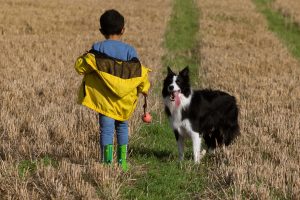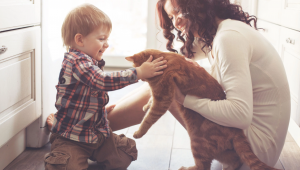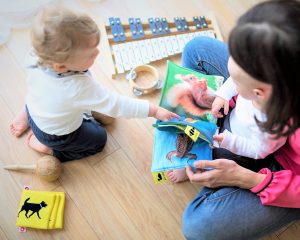Teaching kids to be kind to animals is one of the most important life lessons we can pass along to them. It plays a vital role in kids growing up to respect those who are different from them and to treat them with kindness.
Some people may think that kids will naturally be kind to animals without having to be taught, but that’s not always true. Some kids may not know how to behave around animals.
A child’s attitude toward animals can predict future behavior towards people. Teaching kids kindness toward vulnerable creatures helps them develop empathy for all living things, including other people.
Parents play a key role in teaching their kids to be kind to animals. Just ask Janice, mom of one of our young SPCA super-heroes Jayden Messom.

Lead by example
This is the most powerful tool you’ve got. Always demonstrate kindness and compassion toward animals through your own actions. Janice relates “I taught Jayden the golden rule – that it’s important to treat every person and animal the way you would like to be treated.”
Encourage respectful behavior
Teach toddlers and children handling animals for the first time to be gentle. Explain what the world is like from an animal’s perspective and what can cause them fear or anxiety, such as yelling, grabbing or approaching too quickly. Janice believes “It’s important for any child living with or interacting with animals to understand their ways of communicating with us and to respect their feelings and the signals they send us.”
Show kids how to pet and hold animals the right way
Little kids can sometimes get a bit vigorous with their ‘petting’. Some may accidentally grab or pull animals. Repeat the word ‘gentle’ and show them how it’s done.

Explain that it hurts.
Tell toddlers that animals have feelings and that ear pulling, squeezing or kicking hurts the animal as much it would hurt them. Emphasize that it’s not fun for the animal and can, in fact, be dangerous. Be clear that such actions are not acceptable. If you see your child teasing or taunting, do not ignore this behavior. Step in to correct it immediately and seek help if the behavior continues.
Have kids help with pet care.
If you have pets, give your kids age-appropriate tasks to help with their care – for example, refilling water bowls each day, walking the dog with you. Emphasize the importance of providing regular companionship and love.

Read kids books that show animals as feeling individuals.
A few great examples for teaching empathy are Black Beauty, Charlotte’s Web, Hobbes Goes Home, A Kid’s Best Friend, and The Forgotten Rabbit. Janice says “We read a lot of books about animals in Nova Scotia and other parts of the world. Jayden’s favorite animal is the arctic fox. She has adopted one thought the Earth Rangers program she belongs to. The program teaches her a lot about various animals around the world.”
Foster an animal.
If you love animals but can’t commit to having a full-time pet, fostering is a great way to teach kids the meaning of volunteerism and helping others in need. “Our experience in fostering an animal helped to build character and promoted a sense of responsibility in Jayden,” says Janice.

Visit an SPCA shelter with your kids.
Explain the importance of caring for pets and the responsibilities of pet ownership. Pet a cat or walk a dog together. Make a difference by donating food, blankets or pet toys for shelter animals. Janice shares “Our visits to the SPCA shelter are a wonderful way to strengthen our mother-daughter bond and Jayden’s bond with animals.”
Watch animal-friendly movies together.
Some notable ones for teaching compassion are Bambi, Lassie, Free Willy, Babe, Finding Nemo, and Dumbo.
Observe wild animals in their natural habitat.
Emphasize the importance of respecting wild animals from a distance and protecting their habitat by not littering. Jayden’s mom encourages parents to explore and learn with their children. “We find creatures at the beach and go home to look up what they are and learn more about them.”
Teach kids to be kind to animals. They’ll grow up to be kind to people as well.

